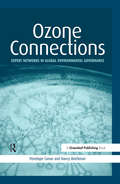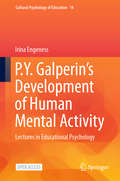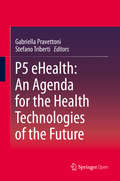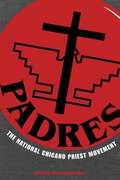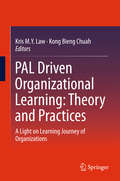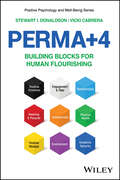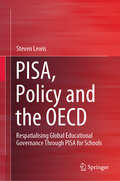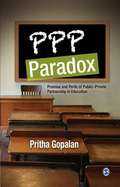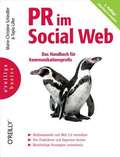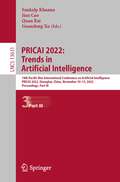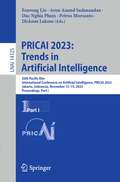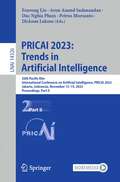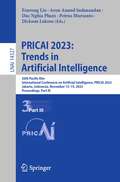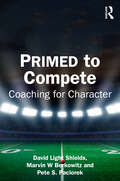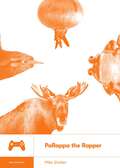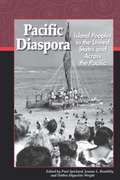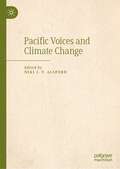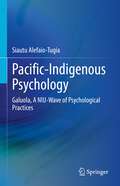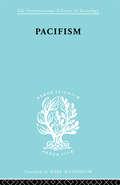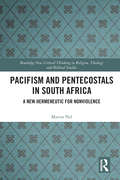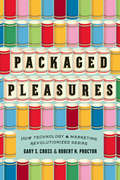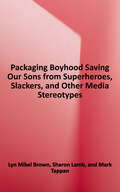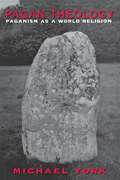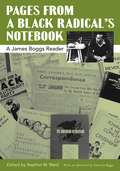- Table View
- List View
Ozone Connections: Expert Networks in Global Environmental Governance
by Penelope Canan Nancy ReichmanIt is difficult to think of a more significant example of international cooperation to address a problem that threatened the health and wellbeing of the entire planet than the 1987 Montreal Protocol for the Elimination of Ozone-Depleting Substances. This breakthrough in international environmental governance has proved to be an extraordinary success beyond rhetoric or promises. In a dozen years, this international agreement went from an understanding of the need to act in a precautionary manner for mutual benefit to a successful worldwide effort to eliminate chemical substances harmful to our protective ozone layer. The production and consumption of most ozone-depleting substances has now been phased out in developed countries, with developing countries not far behind. What happened and why is of tremendous importance for those looking for guidance in the future, particularly those now involved in hugely complicated negotiations on climate change. The success of the Montreal Protocol has been linked to many factors such as political will, treaty flexibility and the recognition of equity issues raised by developing countries. While comprehensively analysing all of these success factors, Ozone Connections goes on to suggest that a social organization of global governance as typified by the protocol's Technical and Economic Assessment Panel (TEAP) was a unique – but replicable – decisive factor. The book argues that we need to understand how the implementation of complex global environmental agreements depends on the construction and exploitation of social connections among experts who act collectively to define solutions to environmental problems. This highly original and provoking thesis synthesises some of the more exciting social science concepts and methods, while refining our basic understanding of environmental social change and providing policy-makers with concrete success factors to replicate. This book will be essential reading for academics in the fields of sociology, political science, international relations, network studies, human communication, motivation, collaboration and leadership, as well as the burgeoning interdisciplinary field of environmental studies. Businesses will also find many applications for practical use. Finally, the many directly transferable lessons from ozone layer protection make this book a key addition to the growing literature on climate change.
P.Y. Galperin's Development of Human Mental Activity: Lectures in Educational Psychology (Cultural Psychology of Education #14)
by Irina EngenessThis open access book introduces the legacy of Piotr Galperin to a wider audience of researchers, educators and psychologists. Previous translations of Galperin’s work present only some aspects of his conceptual thinking; however, his main contribution to the general, genetic and pedagogical psychology as a unique holistic and systemic approach to studying of psychological phenomena and processes, mechanisms of their formation and development, is still quite unknown in most parts of the world.The eight lectures chosen for the book have been translated from Russian for the first time, and they belong to the Study of the Formation of Human Mental Activity from Galperin’s collection of the Lectures in Psychology (Galperin, 2002). These eight lectures present the central ideas of Galperin’s pedagogical theory, and they conceptualise learning to learn approach and argue how teaching and learning process can enhance the development of higher mental functions with learners and therefore enhance the development of students as learners. These ideas may be of primary importance to educational practitioners and researchers interested in developmental learning and teaching approach given the current concerns of educational practice that schools struggle to prepare students for their adult and the need to develop the capacity in lifelong learning with students in the 21st century.
P5 eHealth: An Agenda for the Health Technologies of the Future
by Gabriella Pravettoni Stefano TribertiThis open access volume focuses on the development of a P5 eHealth, or better, a methodological resource for developing the health technologies of the future, based on patients’ personal characteristics and needs as the fundamental guidelines for design. It provides practical guidelines and evidence based examples on how to design, implement, use and elevate new technologies for healthcare to support the management of incurable, chronic conditions. The volume further discusses the criticalities of eHealth, why it is difficult to employ eHealth from an organizational point of view or why patients do not always accept the technology, and how eHealth interventions can be improved in the future. By dealing with the state-of-the-art in eHealth technologies, this volume is of great interest to researchers in the field of physical and mental healthcare, psychologists, stakeholders and policymakers as well as technology developers working in the healthcare sector.
PADRES: The National Chicano Priest Movement
by Richard Edward MartínezFrom the 1848 Treaty of Guadalupe Hidalgo to the 1960s, Mexican American Catholics experienced racism and discrimination within the U.S. Catholic church, as white priests and bishops maintained a racial divide in all areas of the church's ministry. <P><P>To oppose this religious apartheid and challenge the church to minister fairly to all of its faithful, a group of Chicano priests formed PADRES (Padres Asociados para Derechos Religiosos, Educativos y Sociales, or Priests Associated for Religious, Educational, and Social Rights) in 1969. Over the next twenty years of its existence, PADRES became a powerful force for change within the Catholic church and for social justice within American society.
PAL Driven Organizational Learning: Theory and Practices
by Kris M. Y. Law Kong Bieng ChuahPresenting an innovative concept and approach for organization management, this book serves to document an organization's journey towards the ultimate goal of learning organization. This book also shares the experience on how a OL framework built on established learning theories, could be used effectively, overcoming many of the barriers in a real industrial setting. Utilizing a ready-to-use tool called Project Action Learning (PAL) to analyze real life case studies, the authors introduce a framework that allows teams of people to work and learn over the course of business projects. Equal emphasis is placed on the achievement of pre-set project outcomes and the learning objectives of the participants. In addition, a long term organizational learning strategy is put forward and the necessary supporting infrastructure, in the form of four 'PAL Pillars', is described. The concepts and development of the PAL driven Organizational Learning model are inspired by and grounded in, Western and Eastern business philosophies and case studies which offer important insights into the management of organizations who are keen to develop sustainable business practices.
PERMA+4: Building Blocks for Human Flourishing (Positive Psychology and Well-Being)
by Stewart I. Donaldson Vicki CabreraProvides the tools and knowledge to develop and nurture the essential building blocks of a thriving life Understanding how to thrive, not just survive, has never been more critical in today's world. Grounded in over 25 years of peer-reviewed research, PERMA +4: Pathways to Well-Being and Positive Functioning provides a comprehensive guide to the essential building blocks of flourishing. Authors Stewart Donaldson and Victoria Cabrera share the latest evidence while providing actionable insights on how positive psychology interventions can help cultivate happiness and resilience. With clear explanations of nine scientifically validated building blocks, including emotions, engagement, relationships, meaning, and accomplishment, PERMA +4 equips readers with tools to build their well-being while empowering others to do the same. The PERMA+4 framework extends foundational work by integrating new insights into areas such as physical health, mindset, and economic security. Each easy-to-read chapter is packed with practical activities, step-by-step guidance, informational charts and figures, full-color images, "Key Takeaways, " and reflection questions. Offering practical strategies for anyone eager to lead a more fulfilling life, PERMA +4: Introduces the PERMA+4 framework, extending Martin Seligman's foundational well-being theory with new evidence Explains the science behind positive psychology interventions and why they work Integrates findings from more than 1,000 research studies on flourishing and well-being Covers practical applications for education, workplaces, healthcare, and personal growth Ideal for health practitioners, educators, workplace leaders, and well-being coaches, PERMA +4: Building Blocks for Human Flourishing is essential reading for undergraduate, graduate, and professional audiences. It is perfect for courses in positive psychology, public health, leadership, and organizational development, or as a reference for practitioners aiming to enhance well-being in diverse settings.
PISA, Policy and the OECD: Respatialising Global Educational Governance Through PISA for Schools
by Steven LewisThis book explores new modes, spaces and relations of the Organisation for Economic Cooperation and Development (OECD)'s global educational governance associated with the PISA for Schools test. Adopting a theoretically-rich policy sociology approach, with an emphasis on topological understandings of spatiality and power, the book examines the entire PISA for Schools policy cycle, from its initial development, to its administration and promotion in the U.S., and its local enactment by schools and teachers. It demonstrates how PISA for Schools helps to steer how schooling is locally understood and practised through separate and yet overlapping techniques: governing by (1) heterarchy, (2) respatialisation and (3) 'best practice'.The book reveals the specific effects of PISA for Schools as an exemplar of how global educational governance is increasingly enfolded within contemporary schooling, as well as discussing how we might practise a policy sociology in which the local is acknowledged as a relevant space of concern.
PPP Paradox
by Pritha GopalanPublic-private partnerships have been in use for a long time, and in many countries, to build roads and bridges, clean rivers, and manage waste. In the last two decades, they have slowly begun to make their presence felt in the field of public education. Several countries, including the United States and India, have recently enacted laws that include partnerships with private entities as a vehicle for education reform. PPP Paradox discusses a swathe of PPPs in education and assesses their approach and contribution to genuine school change. This broad and even-handed survey of a variety of policy positions is followed by specific accounts of reform efforts in two case studies--one from a partnership in middle-school change in curriculum and instruction that took place in the state of Michigan in the United States, and the other from a partnership to bring Montessori education to government-run schools in Chennai, a large Indian city.
PR im Social Web (O'Reillys Basics)
by Marie-Christine Schindler Tapio LillerInteressante Zeiten für Kommunikationsprofis: Mit dem Erstarken des Social Web verändert sich das Verhältnis zwischen Unternehmen bzw. Agenturen und ihren Dialoggruppen - Transparenz und Austausch werden immer wichtiger. PR im Social Web zeigt, was das für die PR-Arbeit bedeutet. Die Autoren, selbst erfahrene PR-Profis, erläutern die veränderten Rahmenbedingungen und erklären, wie die einzelnen PR-Disziplinen und Unternehmensbereiche von Social Media profitieren können. Zahlreiche Fallstudien, Tipps und Checklisten erleichtern es Ihnen, das Gelesene auf Ihre eigenen Kommunikationsziele anzuwenden. Für die zweite Auflage wurde das Buch komplett aktualisiert und um Kapitel zu Nonprofit-PR und Erfolgsmessung ergänzt. Von der Medienarbeit bis zur Krisenkommunikation Die Medienarbeit wird durch Aktivitäten im Social Web bereichert - Blogger Relations, Monitoring, Issues Management und der Umgang mit Kritik und Krisen sind nur einige wichtige Stichworte. Corporate Publishing und Events Corporate Blogs und Podcasts bieten interessante Publikations- und Dialogmöglichkeiten, und Events erhalten über soziale Netzwerke und Livestreams eine deutlich größere Öffentlichkeit. Personalmarketing und Interne Kommunikation Vom Employer Branding über Recruiting bis zum Einsatz von Social Media im Unternehmen selbst - für die HR-Kommunikation bietet sich das Social Web mit seinen Dialogmöglichkeiten geradezu an. Kundenservice und Support Keine klassischen PR-Disziplinen, doch auch Kundenservice und Support werden durch die Social Media erheblich persönlicher und können so viel Positives zur öffentlichen Wahrnehmung eines Unternehmens beitragen. Wie sich der PR-Beruf ändert Vieles ist im Umbruch, davon sind auch die Aufgabenverteilung zwischen Unternehmen und Agenturen sowie das Berufsbild des PR-Profis selbst betroffen. NEU: Messbarkeit im Social Web: von KPI bis ROI Zahlt sich Social Media-PR überhaupt aus? Auch wenn es bei der Kommunikation im Social Web nicht vorrangig um harte Zahlen geht - strategisch geplant und durchgeführt, lassen sich ihre Erfolge durchaus überprüfen. Der Rechtsrahmen In einem Gastkapitel erläutert Rechtsanwalt Henning Krieg, was bei der Kommunikation im Social Web zu beachten ist - ob bei der Verbreitung von Content oder der Definition von Social Media Guidelines.
PRICAI 2022: 19th Pacific Rim International Conference on Artificial Intelligence, PRICAI 2022, Shanghai, China, November 10–13, 2022, Proceedings, Part III (Lecture Notes in Computer Science #13631)
by Guandong Xu Jian Cao Quan Bai Sankalp KhannaThis three-volume set, LNAI 13629, LNAI 13630, and LNAI 13631 constitutes the thoroughly refereed proceedings of the 19th Pacific Rim Conference on Artificial Intelligence, PRICAI 2022, held in Shangai, China, in November 10–13, 2022.The 91 full papers and 39 short papers presented in these volumes were carefully reviewed and selected from 432 submissions. PRICAI covers a wide range of topics in the areas of social and economic importance for countries in the Pacific Rim: artificial intelligence, machine learning, natural language processing, knowledge representation and reasoning, planning and scheduling, computer vision, distributed artificial intelligence, search methodologies, etc.
PRICAI 2023: 20th Pacific Rim International Conference on Artificial Intelligence, PRICAI 2023, Jakarta, Indonesia, November 15–19, 2023, Proceedings, Part I (Lecture Notes in Computer Science #14325)
by Fenrong Liu Duc Nghia Pham Dickson Lukose Arun Anand Sadanandan Petrus MursantoThis three-volume set, LNCS 14325-14327 constitutes the thoroughly refereed proceedings of the 20th Pacific Rim Conference on Artificial Intelligence, PRICAI 2023, held in Jakarta, Indonesia, in November 2023.The 95 full papers and 36 short papers presented in these volumes were carefully reviewed and selected from 422 submissions. PRICAI covers a wide range of topics in the areas of social and economic importance for countries in the Pacific Rim: artificial intelligence, machine learning, natural language processing, knowledge representation and reasoning, planning and scheduling, computer vision, distributed artificial intelligence, search methodologies, etc.
PRICAI 2023: 20th Pacific Rim International Conference on Artificial Intelligence, PRICAI 2023, Jakarta, Indonesia, November 15–19, 2023, Proceedings, Part II (Lecture Notes in Computer Science #14326)
by Fenrong Liu Duc Nghia Pham Dickson Lukose Arun Anand Sadanandan Petrus MursantoThis three-volume set, LNCS 14325-14327 constitutes the thoroughly refereed proceedings of the 20th Pacific Rim Conference on Artificial Intelligence, PRICAI 2023, held in Jakarta, Indonesia, in November 2023.The 95 full papers and 36 short papers presented in these volumes were carefully reviewed and selected from 422 submissions. PRICAI covers a wide range of topics in the areas of social and economic importance for countries in the Pacific Rim: artificial intelligence, machine learning, natural language processing, knowledge representation and reasoning, planning and scheduling, computer vision, distributed artificial intelligence, search methodologies, etc.
PRICAI 2023: 20th Pacific Rim International Conference on Artificial Intelligence, PRICAI 2023, Jakarta, Indonesia, November 15–19, 2023, Proceedings, Part III (Lecture Notes in Computer Science #14327)
by Fenrong Liu Duc Nghia Pham Dickson Lukose Arun Anand Sadanandan Petrus MursantoThis three-volume set, LNCS 14325-14327 constitutes the thoroughly refereed proceedings of the 20th Pacific Rim Conference on Artificial Intelligence, PRICAI 2023, held in Jakarta, Indonesia, in November 2023.The 95 full papers and 36 short papers presented in these volumes were carefully reviewed and selected from 422 submissions. PRICAI covers a wide range of topics in the areas of social and economic importance for countries in the Pacific Rim: artificial intelligence, machine learning, natural language processing, knowledge representation and reasoning, planning and scheduling, computer vision, distributed artificial intelligence, search methodologies, etc.
PRIMED to Compete: Coaching for Character
by Marvin Berkowitz David Light Shields Pete PaciorekSports can build character. But it doesn’t happen automatically. And good intentions are not enough. PRIMED to Compete: Coaching for Character is the definitive book for coaches who want to optimize young peoples’ experience of competition and promote their character, performance, and overall well-being.This engaging new book brings cutting-edge research and practical sport experience together in an easily accessible and digestible framework. PRIMED to Compete provides a powerful way for coaches to turn the challenges of competition into opportunities for promoting positive character.The three authors bring together a century of expertise in professional and collegiate sports, youth coaching and coach education, and developmental and sport sciences. Building on Marvin W. Berkowitz’s highly acclaimed PRIMED model of character education and David Light Shields’ influential model of True Competition, PRIMED to Compete offers a comprehensive, user-friendly guide to shaping sports environments that build healthy relationships, fair and collaborative mindsets, and core values and virtues. Rooted in science, it provides practical guidance for building team cultures that support both optimal sport performance and character growth across multiple dimensions.
PRODUKTiver im Homeoffice: Innovative Methoden zum besseren Arbeiten im Homeoffice: Psychologisch fundiert (essentials)
by Magdalena Weber Sandra J. Diller Stephanie Bendrat Carina Berger Julian EbnerAufgrund der heutigen Arbeit in einer digitalisierten und globalisierten Welt ist auch das Homeoffice als eine Form von Telearbeit relevant. Um ein besseres Arbeiten im Homeoffice zu ermöglichen, werden in diesem essential Herausforderungen beim Arbeiten im Homeoffice adressiert und basierend auf psychologischen Modellen, Theorien und Forschungskenntnissen Produktideen für die Praxis vorgestellt. Die Ideen sollen innovative Problemlöseprozesse aufzeigen und Anstoß zu eigenen Ideen bieten.
PaRappa the Rapper (Boss Fight Books)
by Mike SholarsIn the mid-90s, a Japanese prog rock star, an American visual artist, and their small team of collaborators made a colorful cartoon hip hop rhythm game that looked and played (and kicked! and punched!) like nothing else on the market. Initially dismissed by some as a curiosity, PaRappa the Rapper was a hit with players that would eventually sell millions of copies, receive two sequels, and inspire entire genres into being. And for author Mike Sholars, PaRappa left a lasting impact. Featuring exclusive interviews with creators Masaya Matsuura and Rodney Greenblat, original voice cast member Saundra Williams, and a medley of sharp game critics and music experts, Sholars&’ PaRappa the Rapper is equal parts recap, remix, and recollection. Sholars uses his love of hip hop and gaming to celebrate PaRappa&‘s unprecedented mechanics, art, humor, cultural specificity, and uplifting themes as he pairs energetic game history with personal memoir to explain how a game about a rapping dog helped him feel seen when he needed it the most. Funny, informative, and sincere, Sholars&’ book is a heartfelt reminder why we all gotta believe.
Pacific Diaspora: Island Peoples in the United States and Across the Pacific
by Paul Spickard Joanne L. Romdilla Debbie Hippolite WrightThe Samoas, Tonga, and Hawai'i receive the greatest focus in this collection of essays, but the overall range is quite broad. Native writers cover various topics, such as history, cultural mores, adapting to changes in language and cultures as they move, the ongoing questions and dynamics of personal identity as emigration from the homeland occurs, questions about the future of indigenous cultures, and more. Includes a detailed bilbliography.
Pacific Voices and Climate Change
by Niki J. P. AlsfordThis book provides a comprehensive overview of issues related to climate change in the Pacific and will be an invaluable reference for those working in this important field. Climate change represents humanity’s greatest threat. The vastness of the Pacific means that no two experiences are the same. This edited volume identifies research that highlights the local impact of climate change on the islands and coastlines of the Pacific. The authors use current research to document climate change via contextually informed studies that engages with local cultures, histories, knowledges, and communities. The transdisciplinary nature and the combination of both academic and non-academic writing makes this book an accessible and important contribution to the field.
Pacific-Indigenous Psychology: Galuola, A NIU-Wave of Psychological Practices
by Siautu Alefaio-TugiaThis book provides an overview of Pacific-Indigenous knowledge as insights of Oceanic citizen-science to inform culturally-safe practice for psychology. It profiles contemporary Pacific needs in areas of crisis such as family violence, education disparities and health inequities, and points to ancient Pacific-indigenous knowledges as tools of healing for global diasporic communities in need. The historical evolution of psychology’s knowledge base and practice illustrates a fundamental crisis in the method of producing knowledge for psychology - the absence of Pacific-indigenous cultural knowledge. It suggests more effective research methodologies grounded in Pacific-Indigenous epistemologies and ontologies for psychology and overall community capability. It fosters practice perspectives and strategies based on NIU-psychology (New Indigenous Understandings) for innovative solutions to modern-day crises of humanity.
Pacifism (International Library of Sociology)
by David A. MartinFirst published in 1998. Routledge is an imprint of Taylor & Francis, an informa company.
Pacifism and Pentecostals in South Africa: A new hermeneutic for nonviolence (Routledge New Critical Thinking in Religion, Theology and Biblical Studies)
by Marius NelMost of the early twentieth-century Pentecostal denominations were peace churches that encouraged a stance of conscientious objection. However, since the Second World War Pentecostals have largely abandoned their pacifist viewpoint as they have taken on a more literal Biblical hermeneutic from their interaction with Evangelical denominations. This book traces the history of nonviolence in Pentecostalism and suggests that a new hermeneutic of the Bible is needed by today’s Pentecostals in order for them to rediscover their pacifist roots and effect positive social change. The book focuses on how Pentecostalism has manifested in South Africa during the twentieth century. Much of the available academic literature on hermeneutics and exegesis in the field of Pentecostal Studies is of an American or British-European origin. This book redresses this imbalance by exploring how the Bible has been used amongst African Pentecostals to teach on the apparent paradox of a simultaneously wrathful and loving God. It then goes onto suggest that how the Bible is read directly affects how Pentecostals view their role as potential reformers of society. So, it must be engaged seriously and thoughtfully. By bringing Pentecostalism’s function in South African society to the fore, this book adds a fresh perspective on the issue of pacifism in world Christianity. As such it will be of great use to scholars of Pentecostal Studies, Theology, and Religion and Violence as well as those working in African Studies.
Packaged Pleasures: How Technology & Marketing Revolutionized Desire
by Robert N. Proctor Gary S. CrossFrom the candy bar to the cigarette, records to roller coasters, a technological revolution during the last quarter of the nineteenth century precipitated a colossal shift in human consumption and sensual experience. Food, drink, and many other consumer goods came to be mass-produced, bottled, canned, condensed, and distilled, unleashing new and intensified surges of pleasure, delight, thrill--and addiction. In Packaged Pleasures, Gary S. Cross and Robert N. Proctor delve into an uncharted chapter of American history, shedding new light on the origins of modern consumer culture and how technologies have transformed human sensory experience. In the space of only a few decades, junk foods, cigarettes, movies, recorded sound, and thrill rides brought about a revolution in what it means to taste, smell, see, hear, and touch. New techniques of boxing, labeling, and tubing gave consumers virtually unlimited access to pleasures they could simply unwrap and enjoy. Manufacturers generated a seemingly endless stream of sugar-filled, high-fat foods that were delicious but detrimental to health. Mechanically rolled cigarettes entered the market and quickly addicted millions. And many other packaged pleasures dulled or displaced natural and social delights. Yet many of these same new technologies also offered convenient and effective medicines, unprecedented opportunities to enjoy music and the visual arts, and more hygienic, varied, and nutritious food and drink. For better or for worse, sensation became mechanized, commercialized, and, to a large extent, democratized by being made cheap and accessible. Cross and Proctor have delivered an ingeniously constructed history of consumerism and consumer technology that will make us all rethink some of our favorite things.
Packaging Boyhood: Saving Our Sons from Superheroes, Slackers, and Other Media Stereotypes
by Sharon Lamb Lyn Mikel Brown Mark TappanPlayer. Jock. Slacker. Competitor. Superhero. Goofball. Boys are besieged by images in the media that encourage slacking over studying; competition over teamwork; power over empowerment; and being cool over being yourself. From cartoons to video games, boys are bombarded with stereotypes about what it means to be a boy, including messages about violence, risk-taking, and perfecting an image of just not caring. Straight from the mouths of over 600 boys surveyed from across the U.S., the authors offer parents a long, hard look at what boys are watch ing, reading, hearing, and doing. They give parents advice on how to talk with their sons about these troubling images and provide them with tools to help their sons resist these mes sages and be their unique selves.
Pagan Theology: Paganism as a World Religion
by Michael YorkThis study identifies paganism as a viable religion, exploring its practices and theology as they are expressed in religious communities across the world. Long dismissed as a miscellany of fringe ideas and practices, Paganism is one of the fastest-growing spiritual orientations in the West. In Pagan Theology, Michael York reframes Paganism as a world religion. He provides an overview of pagan theology and practice while expanding on the concept of paganism itself. He demonstrates it to be a viable spiritual perspective—one which he identifies around the world today in such forms as Chinese folk religion, Shinto, tribal religions, and neo-Paganism in the West. While adherents to many of these traditions do not use the word &“pagan&” to describe their beliefs or practices, York contends that they feature common characteristics for which the label &“pagan&” is appropriate. After outlining these characteristics, he examines many of the world's major religions which, while not themselves pagan, have pagan elements. In the course of examining such behavior, York provides rich and lively descriptions of religions in action, including Buddhism and Hinduism.
Pages from a Black Radical's Notebook: A James Boggs Reader
by Grace Lee Boggs Stephen M. Ward James BoggsBorn in the rural American south, James Boggs lived nearly his entire adult life in Detroit and worked as a factory worker for twenty-eight years while immersing himself in the political struggles of the industrial urban north. During and after the years he spent in the auto industry, Boggs wrote two books, co-authored two others, and penned dozens of essays, pamphlets, reviews, manifestos, and newspaper columns to become known as a pioneering revolutionary theorist and community organizer. In Pages from a Black Radical's Notebook: A James Boggs Reader, editor Stephen M. Ward collects a diverse sampling of pieces by Boggs, spanning the entire length of his career from the 1950s to the early 1990s. Pages from a Black Radical's Notebook is arranged in four chronological parts that document Boggs's activism and writing. Part 1 presents columns from Correspondence newspaper written during the 1950s and early 1960s. Part 2 presents the complete text of Boggs's first book, The American Revolution: Pages from a Negro Worker's Notebook, his most widely known work. In part 3, "Black Power--Promise, Pitfalls, and Legacies," Ward collects essays, pamphlets, and speeches that reflect Boggs's participation in and analysis of the origins, growth, and demise of the Black Power movement. Part 4 comprises pieces written in the last decade of Boggs's life, during the 1980s through the early 1990s. An introduction by Ward provides a detailed overview of Boggs's life and career, and an afterword by Grace Lee Boggs, James Boggs's wife and political partner, concludes this volume. Pages from a Black Radical's Notebook documents Boggs's personal trajectory of political engagement and offers a unique perspective on radical social movements and the African American struggle for civil rights in the post-World War II years. Readers interested in political and ideological struggles of the twentieth century will find Pages from a Black Radical's Notebook to be fascinating reading.
